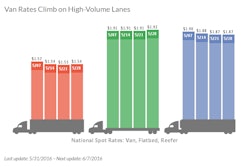
An alliance of U.S. Great Lakes ports, vessel-operating companies and maritime trade associations filed suit Tuesday in the U.S. District Court for the District of Columbia, challenging the U.S. Coast Guard's 58 percent increase in Great Lakes pilotage rates, the American Great Lakes Ports Association reported in a press release.
"Great Lakes pilotage costs have gone up 114 percent over the last 10 years," said Will Friedman, president of the Cleveland-Cuyahoga County Port Authority. "The Coast Guard wants to increase them another 58 percent by 2017. These increases are unsustainable and will ultimately erode the viability of international trade through Great Lakes ports."
Under federal law, all oceangoing vessels on the Great Lakes Seaway System must hire local pilots — navigators familiar with local conditions — to assist with navigation. The Coast Guard regulates and sets rates for Great Lakes pilotage, which is provided by three private companies.
The coalition argues that the Coast Guard violated the Administrative Procedures Act by making "arbitrary and unsubstantiated decisions during development of the 2016 pilotage rates," the news release stated. The plaintiffs have asked the court to remand the rulemaking back to the Coast Guard for revision.
To read more, click here.
Editor's Insight: The Coast Guard might have a good reason for its proposed rate changes, but in the interest of serving the ports fairly, it should explain its rationale for a 58 percent boost in pilotage rates. According to Will Friedman, president and CEO of the Cleveland Cuyahoga County Port Authority, which has been investing in expanding trade with Europe, the continuing rate increases are unsustainable and will ultimately erode the viability of international trade through Great Lakes ports.
The Great Lakes ports have been investing in infrastructure to be more competitive with East Coast ports for global trade as the Midwest has been disproportionately impacted by the recent economic downturn, Food Logistics reported in its January/February issue. If the Coast Guard has a good reason for its recommended changes, a better dialogue with the Great Lakes ports is in order. Responsive government is critical to sustainable trade. 6-2-16 By Elliot Maras











